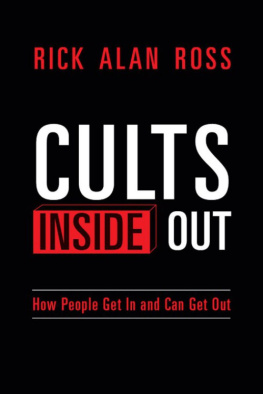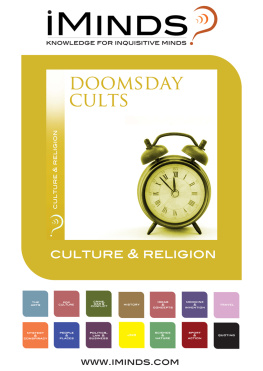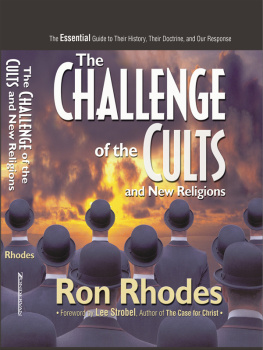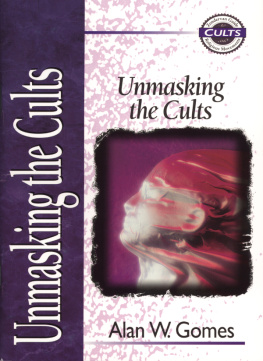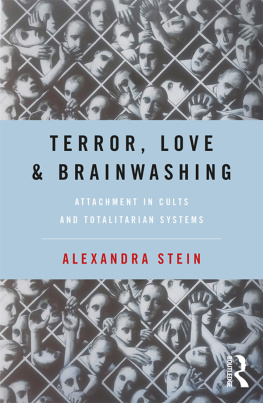CULTS INSIDE OUT
How People Get In and Can Get Out
RICK ALAN ROSS
Copyright 2014 Rick Alan Ross
All rights reserved.
ISBN: 149731660X
ISBN 13: 9781497316607
Library of Congress Control Number: 2014905061
CreateSpace Independent Publishing Platform
North Charleston, South Carolina
FOR HAO HUIJUN AND HER DAUGHTER, CHEN GUO
I met Falun Gong survivors Hao Huijun and her daughter, Chen Guo, after attending an international cultic studies conference in China. Their painfully acquired insight, wrought by a horrible Falun Gonginspired self-immolation, which took place at Tiananmen Square during 2001, is both compelling and inspiring. They quite literally bear the scars of their experience and are icons of truthfulness, compassion and forbearance. This book is dedicated to Hao Huijun and Chen Guo and all former cult members who have moved on to find freedom of mind.
TABLE OF CONTENTS
FOREWORD
My work has placed me in legal settings, and I have been qualified as an expert in courts of law. I know firsthand what is considered the state of art within this field. I have a PhD in psychology and have worked with current and former cult members as a licensed counselor for over twenty years.
In this book Rick Ross describes situations in which a current cult member could be persuaded that he or she needs a replacement for his or her current or former cult leader. This is one reason why we must proceed with caution and due diligence when educating former and current cult members and their families.
This book is unique among the books written about cults. My hope is that people will carefully read it. The author has firsthand knowledge of the subject and is qualified to explain cults based on his many years of experience.
We dont know how many cults actually exist, but we have witnessed the harm they have done. Critics of the term cult generally object to its standardized application, claiming that it denigrates new religious movements. But since many cults are not religious, this objection seems misplaced. Any meaningful investigation into the nature of cults must forego specific beliefs and instead focus on the practices that make a group or relationship harmful. Whatever the cult, there is almost always sustained deception. This fact raises the issue that there is an absence of informed consent.
Rosss decades of inquiry and work related to cults have provided him with knowledge of their pernicious attributes. This background has provided Ross with the tools and ability necessary to recognize their true nature. Not afraid of controversy, he tries to find that delicate balance between exposing cults and encouraging the freedom of undeterred choice.
Cults employ secretiveness, because most people would otherwise not knowingly affiliate with them. Neither intelligence nor family background precludes being tricked and caught by a cult. People who have been caught werent necessarily seeking or looking for something. This book doesnt unfairly stigmatize cult victims; instead it thoroughly discusses the real history of cults and how they trap people. Telling the truth about cults based on facts and research, not speculation, is important.
This is not another book about counseling cult members, though some recovery suggestions are appropriately discussed. We dont know whether everyone in a cult has been traumatized. We do know that many have had very difficult and painful experiences. We dont have the data to support the contention that every former cult member needs professional counseling. But we do know that education about cults has been helpful and is an important facet of recovery, which often alleviates the confusion and suffering of former cult members.
Professional counseling is, by its very nature, a persuasive process. Education focused on critical thinking, the power of persuasion, deception, and indoctrination practices with the support of research is, in my opinion, a better choice to assist former or current cult members.
My concern is that reliance on counseling rather than on education has the potential to create dependence on an authority figure and doesnt necessarily nurture the autonomy and knowledge one needs to make decisions in a rational and systemic fashion. This book is designed to provide its readers with important information that can lead to genuine independence and freedom.
Over the years Rick Ross has established the single-largest website devoted to the topic of cults and their associated practices. This book is a type of capstone to his long-standing work. Ross is effectively in the information and education business. He has labored tenaciously toward providing educational tools for others to help them deal with the ongoing and often misunderstood world of cults.
Some who have encountered the main content of research used in this book in an intervention, counseling, or a legal setting have criticized it. Criticism and dissent are good; they make our theories better. There are no theories that are absolutely proven in science. Some research is better supported than other research. Ross has chosen some of the most familiar models, and they are not without limitations. Good research acknowledges that it needs more ongoing support.
By the end of her life, Dr. Margaret Singer had provided a rich body of work and insight into cult formation. It is impossible for anyone to operate in the realm of cultic studies and not know about Drs. Margaret Singer, Robert Lifton, and Richard Ofshe. However, we must still continue to look for more models of education that can be helpful. This book is a step in the right direction. Instead of merely repeating various theories without attribution, this book is carefully footnoted and offers rare insight into how these theories actually work in real situations with real people.
Contained within the book are illustrations and examples of cultic histories, interventions, and statements about the problems associated with cults. This book will not disappoint, but rather it will provide insight and understanding.
We can all be students, academics, and adventurous seekers of the truth and overcome adversity. But as seekers we must recognize that some organizations are harbingers of danger. Finding the truth is a process that is ideally transparent, engaging, and respectful of each persons unique human spirit.
Cathleen A. Mann, PhD
Lakewood, Colorado
October 2013
INTRODUCTION
My work in the field of cultic studies began rather suddenly and serendipitously in 1982. People associated with a controversial religious group that targeted Jews for conversion infiltrated the paid professional staff of a Jewish nursing home where my grandmother was a resident. A person associated with the group tried to recruit my grandmother. When that attempt failed, the encounter quickly escalated into a hateful confrontation. When I arrived to take my grandmother out for lunch that same day, she was still quite upset about the unsettling experience. She was eighty-two years old at the time and nearing the end of her life.
This covert activity aimed at the elderly angered me. My grandmother had the right to expect privacy, not to suffer the intrusion of an unwanted group bent on somehow exploiting her. In the years since this disturbing encounter, I have learned that destructive cults frequently target and exploit the elderly.
Volunteers often provide meaningful help in nursing homes. There were many volunteers who regularly visited my grandmothers nursing home. Some came specifically in response to requests residents made. But the idea that a group deliberately circumvented the usual process for entry and planted people in the nursing home staff to pursue a hidden agenda was deceptive and unethical.
At the time I had no interest in cultic groups. My only purpose was to make sure my grandmother was as comfortable and happy as possible. She had survived enough hardships during her life and had the right to receive respect and live what was left of her life with dignity. I immediately reported the incident to the executive director of the nursing home. We then worked together, and the people who had surreptitiously infiltrated the nursing home staff, were exposed and summarily dismissed.
Next page
